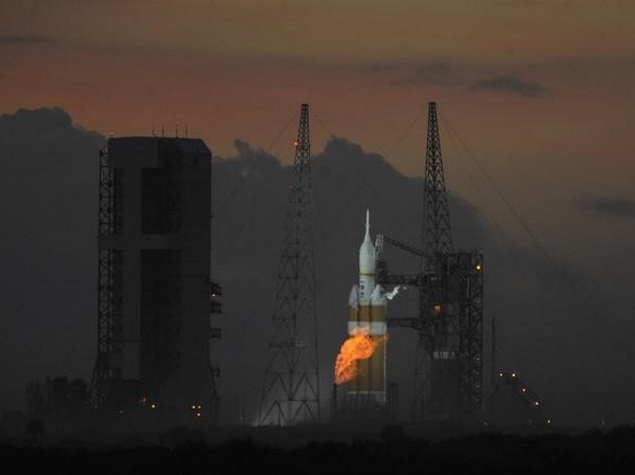- Home
- Science
- Science News
- Nasa Postpones Orion Spacecraft Test Flight to Friday
Nasa Postpones Orion Spacecraft Test Flight to Friday

After multiple aborts in the nearly three-hour launch window on Thursday, Nasa decided to try again Friday beginning at 7:05 am (1205 GMT) from Cape Canaveral, Florida.
No astronauts were aboard the capsule meant to carry humans to an asteroid or Mars in the coming years for this initial flight test.
First, a boat in the waters off the Florida coast delayed the launch, then wind gusts, and finally, problems with the valves on the rocket boosters.
"Despite the valiant attempts of the launch team and mission managers around the country, we basically ran out of time in trying to troubleshoot," said Nasa spokesman Mike Curie.
The delay disappointed thousands of tourists and space enthusiasts who lined the area known as Florida's Space Coast to see the take-off of the Delta IV Heavy rocket powered by three boosters.
The capsule's four-and-a-half hour test flight is due to carry the spacecraft around the Earth twice before splashing down in the Pacific Ocean.
The launch is the first of a US spacecraft meant to carry people into deep space in more than four decades, since the Apollo missions that brought men to the Moon.
With no American vehicle to send humans to space since the space shuttle was retired in 2011, some at Nasa said the Orion launch has re-energized the US space program, long constrained by government belt-tightening and forced to rely on costly rides aboard Russian Soyuz spacecraft to reach the International Space Station in low-Earth orbit.
Potential future missions for Orion, which can fit four people at a time, include a trip to lasso an asteroid and a journey to Mars by the 2030s.
Two laps around Earth
The launch aims to propel 1.63 million pounds (739,000 kilograms) of spacecraft, rocket and fuel straight into space, where the capsule was due to make two laps around the Earth before splashing down in the Pacific Ocean around 11:30 am (1630 GMT).
The first orbit was to be about as high as the International Space Station, which circles at an altitude of about 270 miles (430 kilometers), but the second would soar 15 times higher, to an apogee of 3,600 miles above the Earth.
The chief contractor of the Orion capsule is Lockheed Martin. The spacecraft was first designed to take humans to the Moon as part of Nasa's Constellation program, which was cancelled by President Barack Obama in 2010, in favor of seeking new destinations in deep space.
The goal is both nebulous and costly, and Nasa has already spent $9.1 billion (roughly Rs. 56,183 crores) on Orion and the powerful rocket meant to propel it with crew on board, the Space Launch System (SLS).
Another unmanned test flight is slated for 2018. The first Orion test flight with people on board is scheduled for 2021, and costs are projected to reach $19-22 billion (roughly Rs. 1,17,306 crores to Rs. 1,35,828 crores).
The primary objective of the first flight test, according to Orion program manager Mark Geyer, is to see how the heat shield performs as it reaches temperatures of 4,000 degrees Fahrenheit (2,200 Celsius) on its high-speed plunge back to Earth at a velocity of 20,000 miles per hour.
Get your daily dose of tech news, reviews, and insights, in under 80 characters on Gadgets 360 Turbo. Connect with fellow tech lovers on our Forum. Follow us on X, Facebook, WhatsApp, Threads and Google News for instant updates. Catch all the action on our YouTube channel.
Related Stories
- Samsung Galaxy Unpacked 2026
- iPhone 17 Pro Max
- ChatGPT
- iOS 26
- Laptop Under 50000
- Smartwatch Under 10000
- Apple Vision Pro
- Oneplus 12
- OnePlus Nord CE 3 Lite 5G
- iPhone 13
- Xiaomi 14 Pro
- Oppo Find N3
- Tecno Spark Go (2023)
- Realme V30
- Best Phones Under 25000
- Samsung Galaxy S24 Series
- Cryptocurrency
- iQoo 12
- Samsung Galaxy S24 Ultra
- Giottus
- Samsung Galaxy Z Flip 5
- Apple 'Scary Fast'
- Housefull 5
- GoPro Hero 12 Black Review
- Invincible Season 2
- JioGlass
- HD Ready TV
- Latest Mobile Phones
- Compare Phones
- Tecno Pova Curve 2 5G
- Lava Yuva Star 3
- Honor X6d
- OPPO K14x 5G
- Samsung Galaxy F70e 5G
- iQOO 15 Ultra
- OPPO A6v 5G
- OPPO A6i+ 5G
- Asus Vivobook 16 (M1605NAQ)
- Asus Vivobook 15 (2026)
- Brave Ark 2-in-1
- Black Shark Gaming Tablet
- boAt Chrome Iris
- HMD Watch P1
- Haier H5E Series
- Acerpure Nitro Z Series 100-inch QLED TV
- Asus ROG Ally
- Nintendo Switch Lite
- Haier 1.6 Ton 5 Star Inverter Split AC (HSU19G-MZAID5BN-INV)
- Haier 1.6 Ton 5 Star Inverter Split AC (HSU19G-MZAIM5BN-INV)







![[Partner Content] OPPO Reno15 Series: AI Portrait Camera, Popout and First Compact Reno](https://www.gadgets360.com/static/mobile/images/spacer.png)









